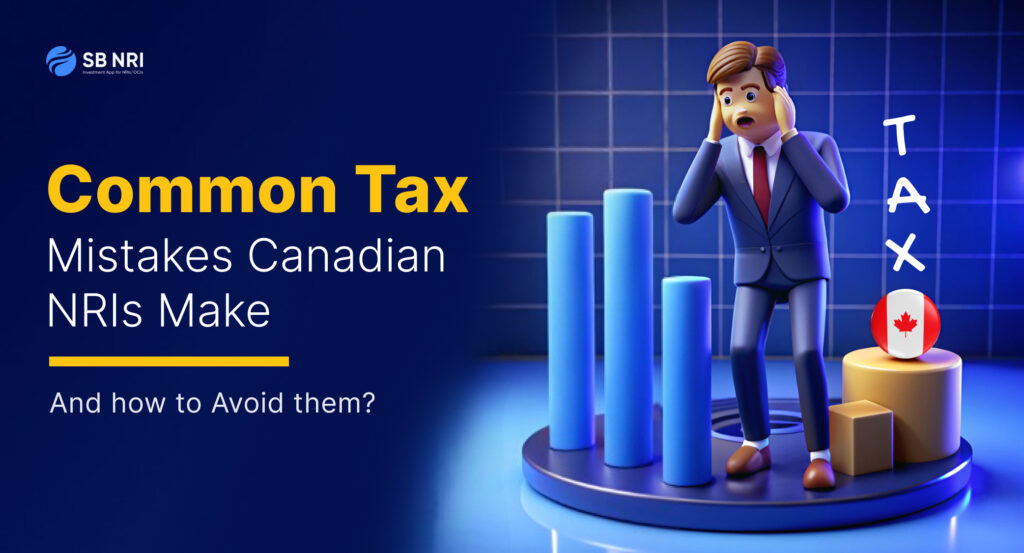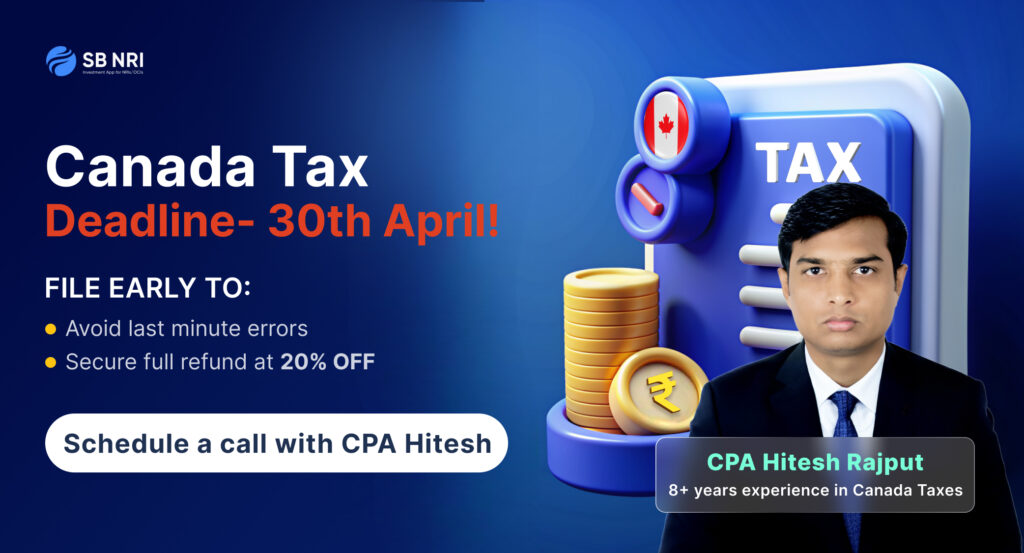
If you’re an NRI who has earned income from Canada—either by working there temporarily or receiving investment/rental income—you might need for you Canada tax filing. But tax season can be confusing. The rules are different for non-residents, and many NRIs end up making costly mistakes.
With the April 30 deadline approaching fast, here are some common tax mistakes Canadian NRIs make—and how you can avoid them easily.
Missing the Tax Filing Deadline
The mistake: Filing your return after the April 30 deadline.
Why it matters:
If you owe taxes and file late, you’ll be charged a penalty of 5% on the amount you owe, plus 1% extra every month you delay (up to 12 months). If you’ve missed your Canada tax filing deadlines in the past, this penalty can be even higher.
What to do:
File your return before April 30, even if you’re unsure about the exact refund or amount owed. Filing on time helps you avoid unnecessary penalties.
Filing Under the Wrong Residency Status
The mistake: Filing your return as a “resident” when you are actually a non-resident for tax purposes.
Why it matters:
Your tax residency status decides:
- What income you must report
- What deductions or benefits you can claim
- Which forms you need to fill
What to do:
If you don’t live in Canada anymore and earn only from Canadian sources, you’re likely a non-resident. Still unsure? Talk to our expert CPA Hitesh Rajput. He can guide you through the right status.
Also read: Canada Taxation for NRIs: Income, Capital Gains & Tax Rates Basics
Forgetting to Claim CPP or EI Refunds
The mistake: Not checking if you’re eligible for a CPP (Canada Pension Plan) or EI (Employment Insurance) refund.
If you worked in Canada but are no longer contributing to these plans (like most NRIs who leave), you might be eligible for a refund of those deductions.
What to do:
Check your T4 slip (a document your employer gives you). If you’ve overpaid in Box 16 (CPP) or Box 18 (EI), you can claim a refund.
Not Reporting All Canadian Income
The mistake: Reporting only part of your Canadian income.
Why it matters:
As a non-resident, you only need to report Canadian-sourced income. But even that must be reported completely and correctly – including jobs, investments, rental properties, etc.
What to do:
Gather all your income slips (T4, T5, rental statements, etc.) before you file. If anything is missing or unclear, you can always reach out to SB NRI ‘s expert CPA Hitesh Rajput for help.

Missing Deductions You’re Eligible For
The mistake: Skipping valid tax deductions that could lower your tax bill or increase your refund.
Common deductions NRIs miss:
- Tuition fees (if you studied in Canada)
- Charitable donations
- Moving expenses (if job-related)
- Interest on student loans
What to do:
Keep receipts. These deductions can make a big difference. Our expert CPA Hitesh Rajput can help you check which ones apply to your situation.
Trying to File Through NETFILE
The mistake: Using NETFILE, which is only for residents of Canada.
Quick explainer:
NETFILE is an online service provided by the CRA (Canada Revenue Agency) for residents to file directly. NRIs cannot use this for Canada tax filing.
What to do:
As an NRI, you’ll need to file using paper forms or through a tax expert. At SBNRI, we handle this entire process for you.
Assuming You Don’t Need to File Because You’re Getting a Refund
The mistake: Thinking there’s no need to file because “you’re due a refund anyway.”
Why it matters:
While the CRA doesn’t penalize late filers who are owed a refund, you can still lose money if you wait too long. Some credits like EI refunds or tax deductions expire after a few years.
What to do:
File your taxes every year before April 30 – even if you think you’re owed money. This keeps things smooth and ensures you don’t miss out.
Skipping a Year Because You Had Low Income
The mistake: Not filing just because you earned a small amount.
Why it matters:
Even if your income was low, you might still be owed a tax refund if taxes were deducted from your pay.
What to do:
If your employer deducted tax from your salary, file your return and get that money back. Our expert can help you review your T4 slip and check your refund eligibility.
Not Keeping Records for 6 Years
The mistake: Throwing away receipts and tax slips after filing.
Why it matters:
The CRA may ask for proof of your income, expenses, or deductions up to 6 years later.
What to do:
Keep a folder—digital or paper—with copies of your tax documents. If you use SBNRI’s tax filing service, we can keep everything safely stored for you.
Not Using a Trusted CA Who Understands NRI Taxes
The mistake: Filing on your own without help from a professional who understands the NRI rules.
Why it matters:
NRI tax filing is not the same as regular Canadian tax filing. Wrong forms or incorrect status can delay your refund – or even cause problems with the CRA.
What to do:
At SBNRI, we have a dedicated CPA who specialises in NRI tax filing. We understand the exact steps for NRIs and make the process simple, quick, and 100% online.
Final Checklist: What You Need to File Before April 30
- Your T4 or other income slips
- Bank or investment statements (if any)
- Details of any deductions or credits you want to claim
- Your SIN (Social Insurance Number)
- Tax forms provided by your employer
- Support from SBNRI’s expert CA
File Smart. File Early. File with SBNRI.
Canada tax filing as an NRI doesn’t have to be stressful. File before April 30 and avoid all the stress.
Let us help you get your refund safely and quickly. With SBNRI, we make it easy.

Our dedicated CPA Hitesh Sharma will handle everything – from paperwork to refunds – so you don’t miss out or pay penalties.
Hitesh is a qualified CPA with over 11 years of experience in Canadian taxation. From simple filings to complex NRI cases, he’s helped 1000+ clients file safely and on time. When it comes to cross-border tax matters, you’re in expert hands.
FAQs
1. What is the tax deadline for Canadian NRIs in 2025?
The deadline to file your 2024 Canadian tax return is April 30, 2025. Filing after this date may lead to penalties if you owe any tax.
2. Do NRIs need to report global income in Canada?
Yes, if you are considered a Canadian tax resident, you must report your worldwide income, even if it’s earned outside Canada.
3. What happens if I miss the April 30 tax deadline?
If you owe tax, you’ll face a 5% penalty on the amount due plus 1% per month, up to 12 months. Filing late can cost you more — financially and legally.
4. Is it necessary to file a tax return if I don’t owe anything?
Yes, you should still file. You may be eligible for refunds or credits (like GST/HST or EI overpayments), which you’ll miss without filing.
5. Can SBNRI help me file my Canadian taxes?
Absolutely! SBNRI’s in-house expert CPA Hitesh Rajput can help you file confidently, avoid costly mistakes, and get your refund faster. He comes with over 11 years of experience in Canada tax-filing and has already helped thousands of NRIs.



